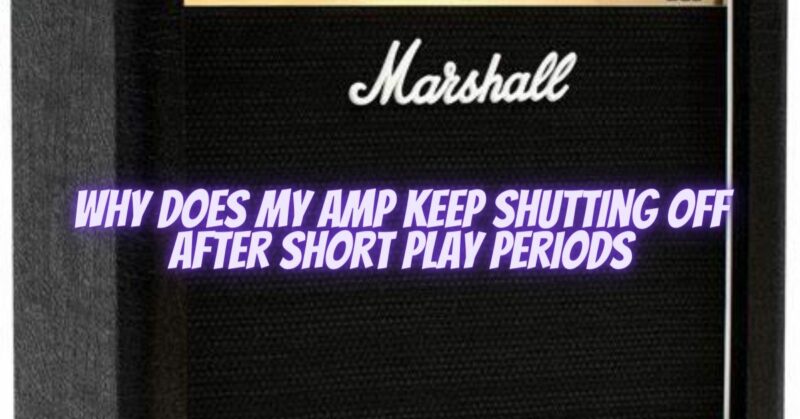Experiencing sudden shutdowns of your amplifier during short play periods can be frustrating and disrupt your musical sessions. Several factors can contribute to this issue, and it’s important to identify the underlying cause to resolve the problem effectively. In this article, we will explore potential reasons why your amp keeps shutting off after short play periods and provide troubleshooting tips to help you address the issue.
- Overheating: Amplifiers generate heat during operation, and prolonged use without proper cooling can lead to overheating. When the internal temperature reaches a critical point, the amp may have built-in protection mechanisms that shut it down to prevent damage. Ensure that your amp has sufficient ventilation and avoid playing at high volumes for extended periods without breaks. Consider relocating the amp to a well-ventilated area and cleaning any dust or debris that may obstruct airflow.
- Power Supply Issues: Inadequate power supply or fluctuations can cause your amp to shut off unexpectedly. Insufficient power from the outlet or an overloaded circuit can strain the amplifier’s power supply and trigger shutdowns. Try plugging the amp into a different power outlet, preferably one dedicated to audio equipment. If the issue persists, consider using a power conditioner or surge protector to regulate the power supply and protect against voltage irregularities.
- Faulty Power or Speaker Cables: Intermittent or faulty power and speaker cables can cause momentary disruptions in the electrical signal, resulting in amp shutdowns. Examine the cables for any signs of damage, loose connections, or frayed wires. Consider replacing them with high-quality cables to ensure reliable and consistent power and audio signal transmission.
- Internal Component Issues: Several internal components within the amplifier can contribute to unexpected shutdowns. These components include transistors, capacitors, or even the amplifier’s power switch itself. If the issue persists despite addressing external factors, it may be necessary to consult a professional technician for a thorough inspection and potential repair or component replacement.
- Short Circuit or Overload: A short circuit or overload can trigger the amp’s protection circuitry, causing it to shut off. Check for any exposed wires, damaged components, or loose connections that may create a short circuit. Ensure that your speaker impedance matches the amplifier’s recommended specifications to avoid overloading the output stage.
- Systematic Failure or Aging: Over time, electronic components can deteriorate or wear out, leading to operational issues. If your amp is significantly aged or has a history of frequent usage, it’s possible that internal components are reaching the end of their lifespan. In such cases, professional servicing may be required to diagnose and replace faulty components.
Conclusion: The recurring shutdown of an amplifier after short play periods can be attributed to various factors, including overheating, power supply issues, faulty cables, internal component problems, short circuits, or aging equipment. By troubleshooting and addressing these potential causes, you can resolve the issue and enjoy uninterrupted play sessions. Remember, if the problem persists or you are uncertain about performing the necessary repairs, it is recommended to seek professional assistance from a qualified technician to ensure a thorough diagnosis and effective resolution.


